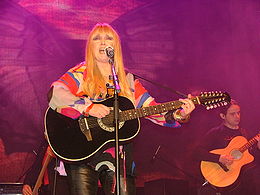- Maryla Rodowicz
-
Maryla Rodowicz
Rodowicz in 2007Background information Birth name Maria Antonina Rodowicz Born December 8, 1945
Zielona Góra, PolandOccupations Singer, Actor Years active 1967–present Website Official Website Maryla Rodowicz (born as Maria Antonina Rodowicz, 8 December 1945 in Zielona Góra) is a Polish singer.
Contents
Early life
She studied at Liceum Ziemi Kujawskiej (The Kujawy region high school) in Włocławek and graduated from the Akademia Wychowania Fizycznego (The Academy of Physical Education) in Warsaw. In her youth she participated in athletics among other things at Kujawiak Włocławek.
Career
Her career began in 1967, after winning first prize at "Festiwal Piosenki i Piosenkarzy Studenckich" (The Student Songs and Singers' Festival) in Kraków. Two years later she recorded her first well-known song, "Mówiły mu" ("The girls told him", English version known as "Love Doesn't Grow On Trees"), and in 1970 - her first longplay. In 1973, she gained popularity with the song "Małgośka" with lyrics by Agnieszka Osiecka. A year later, during the World Cup Opening Ceremony in Munich, she performed a song "Futbol" ("Football").
The singer's body of work comprises over 600 recorded songs, with over 20 Polish albums as well as albums in English, Czech, German and Russian. Apart from "Małgośka", the artist's most famous songs are "Niech żyje bal" ("Long live the ball"), "To już było" ("Done that"), "Wielka Woda ("Great water"), "Rozmowa przez ocean" ("Talk over the ocean"), "Bossanova do poduszki" ("Bedside bossanova"), "Łatwopalni" ("Inflammables") and her latest album's hits such as "Wszyscy chcą kochać" ("Everybody wants to love") and "Będzie co ma być" ("What is to be, will be"). In 2005 she recorded an album "Kochać" ("To love") with lyrics by Katarzyna Nosowska. On the occasion of World Cup 2006, she recorded a song "Za Janasa" ("For Janas") with Nosowska's lyrics.
Rodowicz has performed in concert worldwide: in Europe, America, Australia, and Asia. She has won awards for her singing. She has also participated in various festivals including outside the borders of Poland, for example in Oklahoma City, Los Angeles, and Tulsa, as well as in Poland including Festiwal Piosenki i Piosenkarzy Studenckich (The Student Songs and Singers' Festival) in Kraków and at Krajowy Festiwal Piosenki Polskiej (The National Polish Song Festival) in Opole.
Rodowicz is also an actress who has performed in several movies and in musical entertainment. She regularly performs in a Polsat TV channel series Rodzina zastępcza (Foster Family).
In 1992 she released her autobiography under the title of Niech żyje bal.
Selected discography
- Żyj mój świecie (Live, my world), 1970
- Wyznanie (Confession), 1972
- Maryla Rodowiczova (CSRS) (a Czechoslovakian release), 1972
- Maryla Rodowicz (NRD) (an East Germany release), 1973
- Rok (A year), 1974
- Sing-Sing, 1976
- Wsiąść do pociągu (To enter a train), 1978
- Cyrk nocą (A circus at night/A night lark), 1979
- Święty spokój (The sacred peace), 1982
- Maryla Rodowicz (ZSRR) (A Soviet Union release), 1983
- Był sobie król (There once was a king), 1984
- Gejsza nocy (The geisha of a night), 1984
- Polska Madonna (Polish Madonna), 1987
- Full, 1991
- Absolutnie nic (Absolutely Nothing), 1992
- Marysia Biesiadna (Folklore Marysia), 1994
- Złota Maryla (Golden Maryla), 1995
- Tribute to Agnieszka Osiecka. Łatwopalni (... Inflammables), 1997
- Przed zakrętem (Before the turn), 1998
- Karnawał 2000 (The 2000 Carnaval), 1999
- Niebieska Maryla (Blue Maryla), 2000
- 12 Najpiękniejszych kolęd (The 12 most beautiful Christmas carols), 2001
- Życie ładna rzecz (The life, a nice thing), 2002
- Maryla i przyjaciele (Maryla and friends), 2003
- Nejvetsi hity (a Czech release), 2003
- Kochać (To love), (60,000 copies sold) 2005
- Jest Cudnie (It's wonderful), 2008
- 50 (50), 2010
Songs
The notable Polish Madonna written by Agnieszka Osiecka (an emotional portrait of an average Polish woman trying to make ends meet) contains clear Catholic symbolism and references to the social circumstances characteristic to Poland in the late eighties that marked the end of the communist era in Poland. In this song, the author questions whether the "Polish Madonna" (or, in other words, the Catholic Saint Mary, usually portrayed as holding baby Jesus in her arms) has enough money to pay for rent, promising her that the child will get a welcome allowance to the public kindergarten. The old communist promises are never fulfilled for her, and her dreams of having a lipstick "made in France" can only come true in her dreams. The song won journalists' prize at the Opole festival in 1987.
External links
Categories:- 1945 births
- Living people
- People from Zielona Góra
- Polish people of Russian descent
- Polish actors
- Polish female singers
Wikimedia Foundation. 2010.


